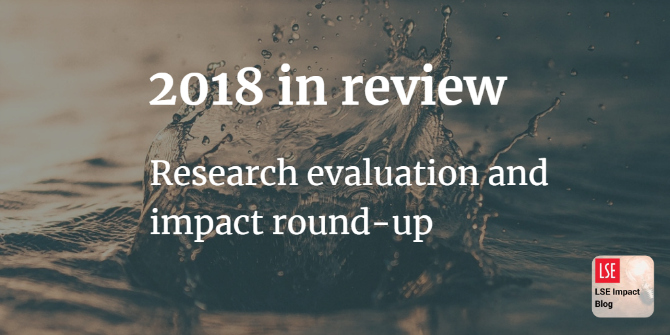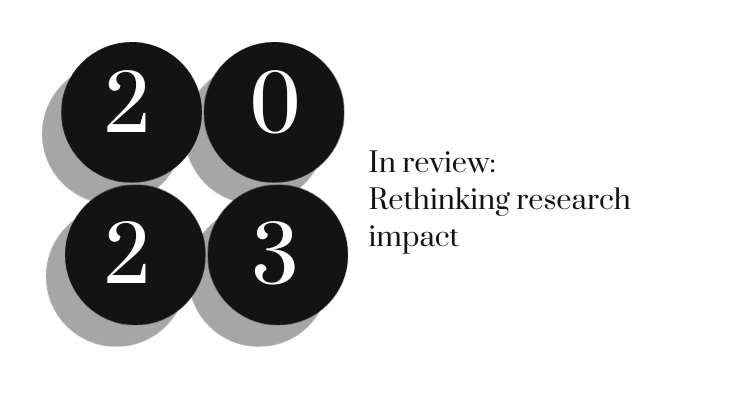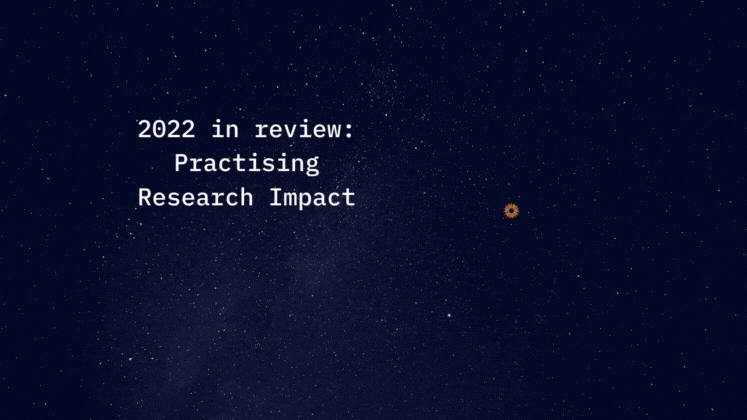
“Remember a condition of academic writing is that we expose ourselves to critique” – 15 steps to revising journal articles
 Before having your paper accepted for publication you’ll almost certainly be required to revise it at least once. For less experienced authors this may not feel so straightforward. Deborah Lupton has compiled a list of tips for authors who have been asked to revise their article. Remember that being exposed to critique is an inevitable part of academic writing, challenge yourself to improve your work, address all reviewer comments, and you’ll be ready to resubmit.
Before having your paper accepted for publication you’ll almost certainly be required to revise it at least once. For less experienced authors this may not feel so straightforward. Deborah Lupton has compiled a list of tips for authors who have been asked to revise their article. Remember that being exposed to critique is an inevitable part of academic writing, challenge yourself to improve your work, address all reviewer comments, and you’ll be ready to resubmit.
The importance of being REF-able: academic writing under pressure from a culture of counting
 Writing is crucial to an academic’s role of producing, shaping and distributing knowledge. However, academic writing itself is increasingly being shaped by the contemporary university’s managerial practices and evaluation frameworks. Sharon McCulloch describes how her research on academics’ writing practices has revealed tensions around the ways in which managerial practices interact with academics’ individual career goals, disciplinary values and sense of scholarly identity.
Writing is crucial to an academic’s role of producing, shaping and distributing knowledge. However, academic writing itself is increasingly being shaped by the contemporary university’s managerial practices and evaluation frameworks. Sharon McCulloch describes how her research on academics’ writing practices has revealed tensions around the ways in which managerial practices interact with academics’ individual career goals, disciplinary values and sense of scholarly identity.
On (re)building institutional writing cultures
 Pat Thomson suggests the benefits of restoring a writing-oriented organisational culture to the modern-day university. A more social, communal setting can create the conditions necessary for gaining confidence as a writer. Writing is core to our disciplines and so ought to be at the very heart of our everyday university lives. While this would certainly require institutional leadership, it also depends on the initiative and choices of communities of scholars.
Pat Thomson suggests the benefits of restoring a writing-oriented organisational culture to the modern-day university. A more social, communal setting can create the conditions necessary for gaining confidence as a writer. Writing is core to our disciplines and so ought to be at the very heart of our everyday university lives. While this would certainly require institutional leadership, it also depends on the initiative and choices of communities of scholars.
Citations are more than merely assigning credit – their inclusion (or not) conditions how colleagues regard and evaluate your work
 The significance of citations goes far beyond energising and rewarding academic competition. Patrick Dunleavy outlines why citations are so important; from setting up a specialist discourse in an economical and highly focused manner, guiding readers seeking to follow your extended chain of reasoning, right through to showing you have comprehensively surveyed all relevant work and pointed out its consistencies (or otherwise) with your own findings. A better appreciation of the multiple functions of citations should help to address the chronic under-citation that particularly besets the humanities and social sciences.
The significance of citations goes far beyond energising and rewarding academic competition. Patrick Dunleavy outlines why citations are so important; from setting up a specialist discourse in an economical and highly focused manner, guiding readers seeking to follow your extended chain of reasoning, right through to showing you have comprehensively surveyed all relevant work and pointed out its consistencies (or otherwise) with your own findings. A better appreciation of the multiple functions of citations should help to address the chronic under-citation that particularly besets the humanities and social sciences.
Anarchy in the academy: why create an academic poster?
 Conventional academic research communication is formulated in sentences and paragraphs, charts and graphs, chapters or papers. PhD students are required to do a lot of reading and writing; obsessing over chapter and thesis structure, often becoming lost in multi-clausal sentences. For Sarah Foxen, the academic poster is a form of knowledge communication which explodes the boundary walls of academic convention, opening up a space for alternative forms of expression. Creating an academic poster can enable you to see your research differently, to think about colour and composition, and realise the power and value of alternative mediums of academic expression.
Conventional academic research communication is formulated in sentences and paragraphs, charts and graphs, chapters or papers. PhD students are required to do a lot of reading and writing; obsessing over chapter and thesis structure, often becoming lost in multi-clausal sentences. For Sarah Foxen, the academic poster is a form of knowledge communication which explodes the boundary walls of academic convention, opening up a space for alternative forms of expression. Creating an academic poster can enable you to see your research differently, to think about colour and composition, and realise the power and value of alternative mediums of academic expression.
Why has submitting a manuscript to a journal become so difficult? A call to simplify an overly complicated process


Submitting to a journal is a fraught activity for authors. But why should this still be the case? James Hartley and Guillaume Cabanac argue that the process has always been complicated but can be improved. By adopting standardised templates and no longer insisting on articles being reformatted, the submission process can quickly be simplified.
A number of freely available tools can help you improve your literature review routine and stay on top of published research

 The sheer proliferation of newly published research articles can make staying on top of the literature a daunting, time-consuming task. Moreover, not being a deadline-driven activity, it can also fall down lists of priorities and be difficult to integrate into the everyday routine. Erzsébet Czifra-Tóth and Jon Tennant have put together a short sequence of steps and flagged a number of freely available online tools that will help researchers to easily integrate an effective literature review and discovery routine into their work lives. These include refined search and discovery options and a number of customised, organised alerts.
The sheer proliferation of newly published research articles can make staying on top of the literature a daunting, time-consuming task. Moreover, not being a deadline-driven activity, it can also fall down lists of priorities and be difficult to integrate into the everyday routine. Erzsébet Czifra-Tóth and Jon Tennant have put together a short sequence of steps and flagged a number of freely available online tools that will help researchers to easily integrate an effective literature review and discovery routine into their work lives. These include refined search and discovery options and a number of customised, organised alerts.
A PhD by publication allows you to write for real and varied audiences, inviting intellectual exchanges that benefit your research
 A PhD by publication requires doctoral candidates to submit a set of papers for peer-reviewed journals plus an integrating chapter, rather than the more traditional doctoral dissertation. This remains a less common, sometimes frowned-upon model, but Jørgen Carling outlines eight reasons why a PhD by publication might be a good option. It allows you to write for real, varied audiences, with differing levels of ambition, and can help you build a name for yourself in academia, which is important not only for your career but also as it affords you opportunities for vital intellectual exchanges that may benefit your research.
A PhD by publication requires doctoral candidates to submit a set of papers for peer-reviewed journals plus an integrating chapter, rather than the more traditional doctoral dissertation. This remains a less common, sometimes frowned-upon model, but Jørgen Carling outlines eight reasons why a PhD by publication might be a good option. It allows you to write for real, varied audiences, with differing levels of ambition, and can help you build a name for yourself in academia, which is important not only for your career but also as it affords you opportunities for vital intellectual exchanges that may benefit your research.
Writing a coherent integrative chapter is crucial for a successful PhD by publication

 Above, Jørgen Carling outlines the reasons why he feels the PhD by publication is a good model for doctoral candidates to choose. Here, prompted by the relative scarcity of supporting resources available, Pirjo Nikander and Nelli Piattoeva offer advice for any prospective PhD-by-publication candidates looking to plan the writing of their integrative chapter. Crucial to convincing the readership (and examiners) of the scientific value of the PhD, the integrative chapter is more than a simple “mopping-up” activity at the end of a research project, and deserves careful attention and planning.
Above, Jørgen Carling outlines the reasons why he feels the PhD by publication is a good model for doctoral candidates to choose. Here, prompted by the relative scarcity of supporting resources available, Pirjo Nikander and Nelli Piattoeva offer advice for any prospective PhD-by-publication candidates looking to plan the writing of their integrative chapter. Crucial to convincing the readership (and examiners) of the scientific value of the PhD, the integrative chapter is more than a simple “mopping-up” activity at the end of a research project, and deserves careful attention and planning.
“A thesis is written for examiners, an academic book for scholars in general” – the basics of writing a book from your PhD
 Researchers who have recently completed a PhD will inevitably be considering what route to take to publication. Terry Clague outlines some of the various options, offering an insight into what questions a publisher might ask when assessing a proposal for a research book. Would-be book authors are encouraged to be mindful of the significant and ongoing changes to the academic books market, with online discoverability of paramount importance. And when it comes to preparing the manuscript itself, there are a number of simple pointers that can help authors to effectively structure, write, and edit their work.
Researchers who have recently completed a PhD will inevitably be considering what route to take to publication. Terry Clague outlines some of the various options, offering an insight into what questions a publisher might ask when assessing a proposal for a research book. Would-be book authors are encouraged to be mindful of the significant and ongoing changes to the academic books market, with online discoverability of paramount importance. And when it comes to preparing the manuscript itself, there are a number of simple pointers that can help authors to effectively structure, write, and edit their work.
Post-publication blues: how getting published can be the beginning and not the end of your publication woes
 To many authors, the point of publication can feel like the culmination of a process; the moment one’s troubles are over. But for many others, it can mark the start of a new set of wholly unanticipated problems. Elizabeth Gadd discusses some of the challenges she has faced after having her own papers published; from a lack of certainty about rights retained, through unwelcome surprises emerging after the copy editing process, to the interminable wait for a paper to be recognised by important abstract and indexing databases.
To many authors, the point of publication can feel like the culmination of a process; the moment one’s troubles are over. But for many others, it can mark the start of a new set of wholly unanticipated problems. Elizabeth Gadd discusses some of the challenges she has faced after having her own papers published; from a lack of certainty about rights retained, through unwelcome surprises emerging after the copy editing process, to the interminable wait for a paper to be recognised by important abstract and indexing databases.
Make sure your book is discoverable! Advice for the reader-oriented author
 Although academic book publishing remains dominated by print, the ability to reach readers is now hugely dependent on the online discoverability of scholarly books. Authors looking to connect with as wide a readership as possible should consider how to maximise the chances of their books and chapters being returned in readers’ online searches. Terry Clague offers some simple advice to the reader-oriented book author.
Although academic book publishing remains dominated by print, the ability to reach readers is now hugely dependent on the online discoverability of scholarly books. Authors looking to connect with as wide a readership as possible should consider how to maximise the chances of their books and chapters being returned in readers’ online searches. Terry Clague offers some simple advice to the reader-oriented book author.
Against “reductionism”: envisioning each piece of writing in its own right, not as a version of something else
 It’s not uncommon for authors to be asked to submit a shortened version of a research article or piece of writing. This, says Thomas Basbøll, is too often looked upon as a problem of “reduction”, of pruning a longer text. Rather, the enormous surplus of knowledge that the longer text demonstrates the author has is a material resource for producing a different, shorter text. By using a key-sentence outline, authors can plan and reorganise the longer text without setting a material constraint on the shorter one.
It’s not uncommon for authors to be asked to submit a shortened version of a research article or piece of writing. This, says Thomas Basbøll, is too often looked upon as a problem of “reduction”, of pruning a longer text. Rather, the enormous surplus of knowledge that the longer text demonstrates the author has is a material resource for producing a different, shorter text. By using a key-sentence outline, authors can plan and reorganise the longer text without setting a material constraint on the shorter one.







